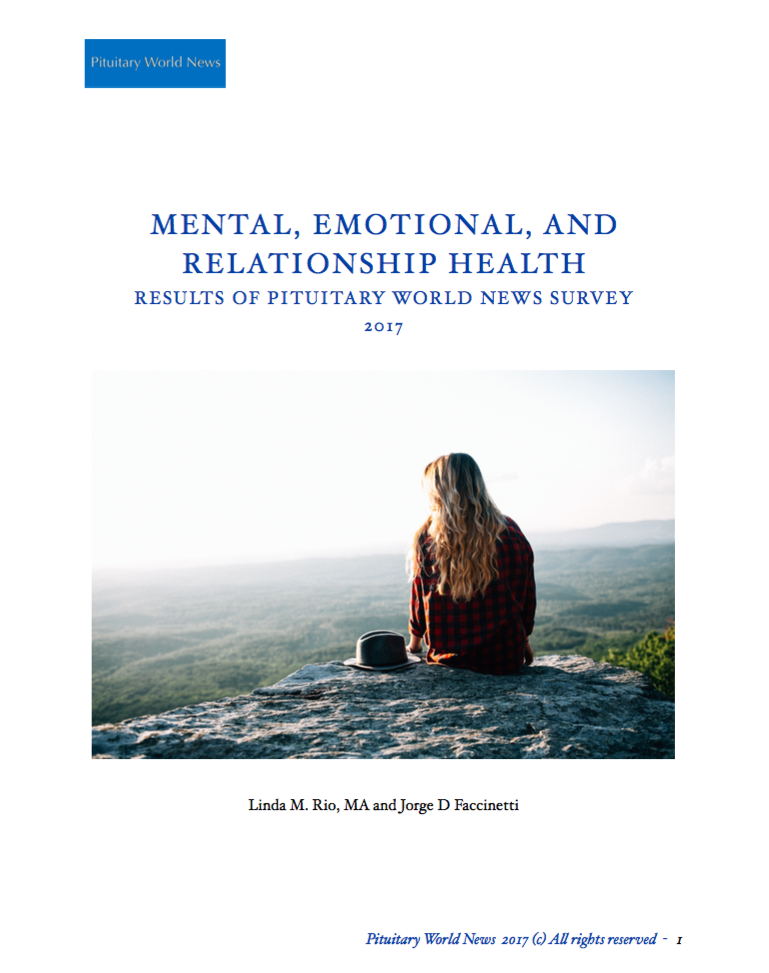From Linda M. Rio and Jorge D. Faccinetti – In December 2016 into early January 2017 Pituitary World News asked viewers to respond to a simple online survey. We have done this in the past by eliciting responses to medical symptoms and concerns. This time was the first to ask about whether patients and/or family members observed and experienced symptoms related to their mental, emotional and behavioral health.
Traditionally Western medicine and mental health have few formal points of intersection. Peer reviewed journals in medicine as well as mental health often report research only in areas of scientific interest specific to that publication and field of study. Tumors and other disorders of the pituitary gland may require a new perspective that requires a broader lens by treatment professionals in multiple fields of study in order to more comprehensively meet the full spectrum of patient needs. This survey was conducted to determine the existence of mental health symptoms among patients or family members. Responses demonstrated a wide array of significant mental health, family and relationship issues. Implications for specialty pituitary treatment centers, general medical providers and mental health professionals to increase awareness of the need for improved assessment of mental health needs of pituitary patients and their families is indicated.
The US Department of Health and Human Services states that the causes of health and disease are generally viewed as a product of the interplay or interaction between biological, psychological, and sociocultural factors (1999, p. 49). Examination from multiple perspectives of the potential impact tumors of the pituitary gland and other related disorders have, not only on physical but also mental health, may provide insight into additional patient needs from both a medical as well as psychological lens. It is not a new concept to recognize the mental-physical connection (Sobrinho, 2014; Sonino & Fava, 1998). Listening to what patients themselves are saying about the impact may also provide insight into additional needs that may not be currently addressed either within general or specialty care (endocrine). Discovering that a hormonal imbalance or even a tumor on the pituitary gland can be related to bipolarity, apathy, anxiety, anger, and more is new for the psychological community to embrace (Knutzen, 2007). Increasingly, the more traditional medical field is recognizing the need for treatment approaches that incorporate the mental health needs of patients as well as their physical care and mental health professionals are needed as essential members of a well-formed treatment team (Rio, 2012).
Many psychosocial aspects of pituitary disorders have been well-documented (Kassi, Kaltsas, & Chrousos, 2013). and include mood and personality alterations. A person with pituitary disease may incur a variety of losses, from the loss of seeing oneself as healthy and invincible to an inability to work, to loss of sex drive and intimacy, to the inability to fulfill other normal social roles in life (Golden, 2013, p. 17). Cushing’s Disease is one example because it is characterized by such symptoms as truncal obesity, diabetes, hypertension, muscle weakness, and emotional lability. Since women are affected five times more often than men and are often misdiagnosed as obese or depressed (Stewart, 2004) they may first find themselves in a primary care physician or psychotherapist’s office searching for help when what they need is highly specialized medical help. Famed physician, Dr. Harvey Cushing acknowledged that ‘psychic traumas’ may play an important role in the pathogenesis of pituitary disease (Cushing,1913). In fact, he attributed what Freud’s psychoanalysis focused on, the various neuroses and asthenias, as arising from a dysfunction of the pituitary gland and not vice versa. The term trauma is widely used today in psychology to represent emotional and/or physical events considered outside the realm of normal living and emotionally disturbing to the person. Trauma can consist of one major life event, for example surviving a plane crash or witnessing extreme violence, or it may be more subtle, for example, multiple events like a child growing up in an alcoholic or abusive home.
Acromegaly is often undiagnosed and unrecognized. Changes in personality that include increased irritability, anxiety and agitation have been described in the medical literature. Recent treatment recommendations for Acromegalic patients and their families include the need to assess for possible posttraumatic stress disorder (PTSD), and Adjustment Disorders due to the above-mentioned symptoms (Furman & Ezzat, 1998).
Without meaning to do so family members may discount or deny the significance of a person’s symptoms, especially in cases of weight gain. Excessive weight gain is common in those with pituitary disorders and may be due to the overproduction or over replacement of cortisol; the result of a deficiency in the normal production of pituitary hormones such as Growth Hormone (GH), thyroid hormones, or gonadal steroids; or due to lower metabolic rate (Utz, 3013). Since pituitary disorders are sometimes particularly difficult to diagnose, and can take months to years to discover, this can be particularly problematic for families to understand. Unknowingly, the members of an individual’s support system often minimize the experience or give an impression that the condition is not believable, particularly when acute symptoms are present one day and few or none are present the next (Olney & Brockelman, 2003; Valeras, 2011.
In spite of the prevalence of pituitary disorders and documented mental health symptoms reported in medical literature, there remains a dearth of information for the professional mental health community. This survey was designed to assess the current state of mental health symptoms, and if present what specifically are patients and/or family members observing? Our hope was also to assess the viability of doing another similar study that might meet the scientific rigors to enable acceptance into the behavioral sciences literature.
In it, you can read about the types of positive and negative experiences and frustrations shared by the people that participated.
 The survey report is available by downloading it here. Or, you can click on the visual (left) to access the complete report.
The survey report is available by downloading it here. Or, you can click on the visual (left) to access the complete report.
It is impossible to report on the enormity and extent and impact in reading all the responses that were given. The tables submitted here do not do justice to the extremely personal and emotional descriptors that were provided. When we initially decided to pose this survey, we were not sure what to expect. The responses have been overwhelming in number, but more importantly highly emotional to read. Once we saw how freely patients were willing to describe their symptoms, their lives it seemed like such a compelling project to attempt to succinctly summarize such pain, desperation…and sometimes hope. Our intention is to use the information gathered in this survey to spurn enthusiasm for continued study and research into the mental and medical aspects of pituitary illnesses. We need to know more and more need to know about this. This paper has in no way done justice to all of that those who responded gave to us but because of the words sent through this survey, we will continue to try to educate and inform as best as we can. We are most grateful to all those who submitted to this survey.
The survey report is available by downloading it here.
More on Author and Pituitary World News contributor Linda M. Rio, MA
Linda can be reached at www.lindamrio.com
Linda’s book “The Hormone Factor in Mental Health” is available through Amazon.com and other major booksellers. Click here for a direct link to the book page on Amazon.
© 2017 – 2022, Pituitary World News. All rights reserved.
